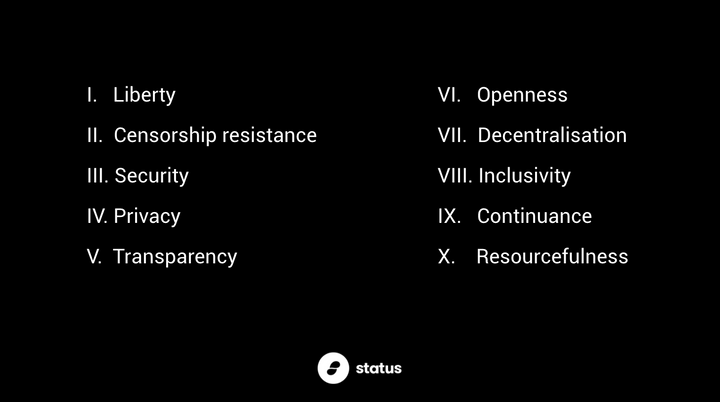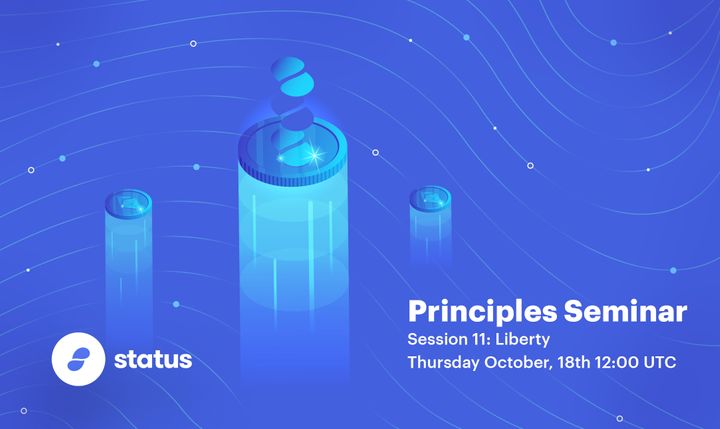In the tenth session of this 12 part series, join status' core contributors as we discuss and debate to which degree we uphold our principles, how we can improve our performance, and what we're adding to our Wall of Shame.
Resourcefulness:
We are relentlessly resourceful. As we grow and have ready access to capital, it is our obligation to token holders to fight bureaucracy and inefficiencies within the organization. This means solving problems in the most effective way possible at lower economic costs (in terms of capital, time and resources
Slide Deck:
Seminar Opening presentation
Seminar Index
Resourcefulness Session Notes (reprinted below)
Youtube:
Wall of shame
- We are a hybrid - inefficient as a traditional corporation, inefficient as a DAO (we're not one)
- Approach to designing MVP, we do big bang designs that require building raw materials from scratch vs using core components. Not aligned with most OKRs. If not aligned, why do it? More doing it for other reasons, not explicitly stated. Bureaucracy etc. Takes longer to build and iterate and learn from users. Can be done by out of box components and iterate on them.
- As hybrid, not clear how we make decisions on how much money we spend on people things travel etc. Lack of visibility / collective oversight on spending. Don't have tools for that.
- Don't have governance to even do that (financial oversight etc, spending decisions).
- Miss strong opinions on direction to take. E.g. ENS username price set, important decision. Not enough people who can take opinion of what price is. Analyze and give answer. Economic decision.
- Hard to be resourceful if you don't what building. E.g. host dinner party 4 people. Going to buy right portions. For us could be 4 people or 200, could be vegans or meat eaters, not a dinner it is a cocktail party. Etc. Greater clarity on exactly what building.
- Feeling: there was ICO, we cash rich, can do whatever. Get into more mindful space. Finite reserve think mindset. Financial awareness lacking a bit. Mindset not obvious.
- Being resourceful means understanding resources you have which we don't do. Need clear insight. Weakest principle of all of them. Specifically chose org structure that is inefficient. Pairings principles, can talk a lot more about this.
Notes:
[Michael]
My primary impression is that we're inefficient as a company, and inefficient as a DAO (because we don't have one). Lack of understanding how to get from company -> DAO.
[Corey]
Yes, but it's partially my fault because I spread myself thin. There's no strong guiding beacon to put you on the right path. It's worthwhile to figure this out, but there's no good model because it doesn't exist.
[Michael]
There are some good examples (co-ops).
[JB]
No good example of an org that is; a) remote b) decentralized and c) leaderless
[Michael]
Should we have leaders?
[Corey]
There are some self appointed ones.
[Michael]
Mark E asked: Is there place for competent? Or does everyone have to be a rockstar?
Classic start up territory. We're all wearing multiple hats.
[Corey]
Don't think we can resolve some of these conflicts. We're prioritising some of these priorities. Upholding other principles may come at the cost of efficiency. Slack was efficient. It was easy to communicate. We're taking a trade-off by moving away from slack.
[Michael]
Are we being resourceful in doing these seminars?
[Corey]
Yes, people are being heard. Leads to quality discussions in Prague - should be really productive.
[Michael]
Should we do this quarterly? At what pace should we have these discussions?
[Chad]
We should take a moment to celebrate our wins.
[Michael]
We're all too hard on ourselves - we've done great work.
[Oskar]
Think about it as a book of opportunity. As our collective brains get upgraded, we should discuss again.









